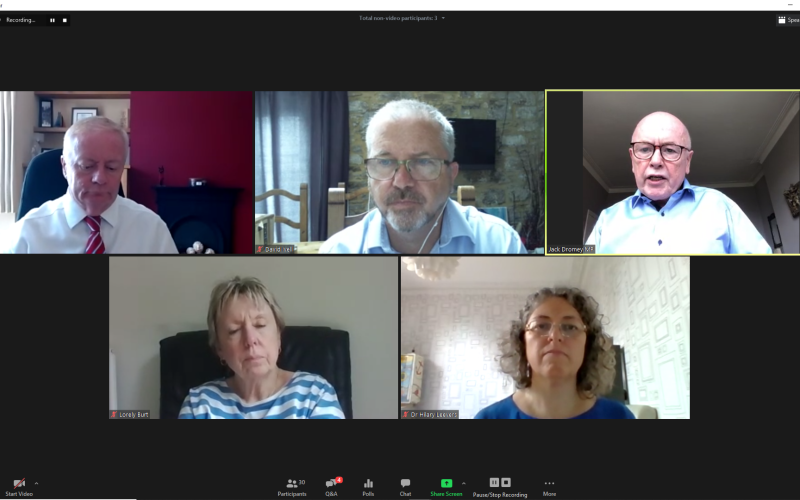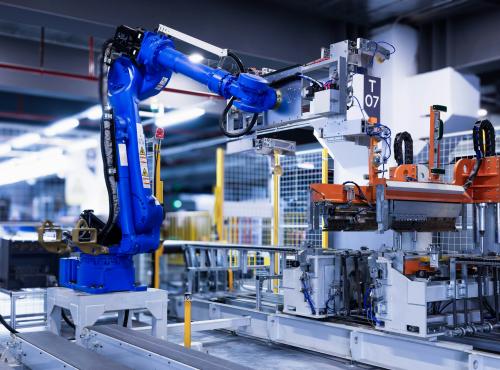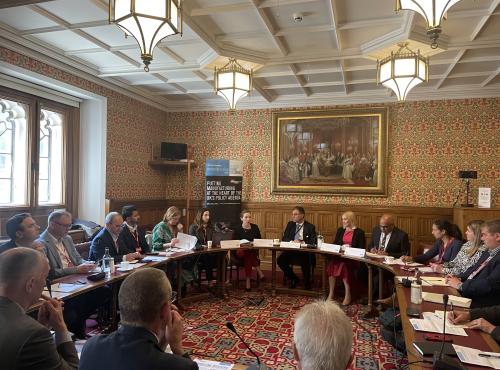APMG webinar looks at redeploying skills post- COVID-19
On Wednesday 8th July, the APMG brought together a distinguished panel of expert voices from across industry for a webinar chaired by APMG Co-Chair Jack Dromey MP. The panel discussed how the manufacturing sector redploy and reutilise newly available skills in the wake of the COVID-19 pandemic to enable the sector to address exisiting skills gaps and keep employment levels high.
The APMG's fifth webinar featured a panel of experts and leaders drawn from across the manufacturing sector, who addressed an audience from across the manufacturing and wider business community. Jack Dromey opened the meeting, welcoming attendees and panelists and topic. Jack spoke of his personal experiences working with major manufacturers to keep industry in the UK and the value they add as they continue to provide huge opportunties for young people. He also referenced figures from Make UK and the Motor Retail Industry which painted a stark picture of future employment in the sector and more widely.
The first speaker was Tim Thomas, Director of Labour Market and Skills Policy at Make UK. Tim gave an overview on Make UK's current work on skills as well as providing an economic update and covering digital skills. He explained that all providers - including Make UK themselves - are facing a considerable drop in starts, with some members delaying starts to Q1 2021. Tim also highlighted the pressures facing the training provider network and explained that 45% of maufacturers will continue with apprenticeship training plans, meaning 55% are not with over 70% changing their training plans following the pandemic. He then considered the incentives being offered by the government such as the £1000 for each furloughed employee brought back and kept until 2021, the kickstarter scheme and investment on careers advisors and traineeships. Tim also noted that the cost of the proposed skills and apprenticeship investment amounts to £1.6bn despite the levy amounting to over £3bn. Finally, Tim looked to digital skills, noting that they have the potential to ad huge value to manufacturing and called on government to look more long-term to ensure the incoming skills pipeline meets the demands not only of now, but also of the future.
Second to present was David Ivell, Chief Technology Officer at Enginuity. David presented on how Data Science can be used to redeploy engineers displaced by the COVID pandemic. David explained that Enginuity have been addressing both the displacement of skills and also using a game to identify young people who may be great engineers but struggle to express their skills in traditional methods. He then explained that new technology has enabled Enginuity to understand how things are written in context, essentially understanding the equivalency of skills betweem different employers and sectors to enable engineers to access careers outside their original specialism and to allow employers to address skills gaps. This data then allows engineers to understand their skills gaps and address them through online training to ensure they meet the role profile they apply for. This holistic approach utilising data science presents a route for engineers to broaden their horizons whilst also having more succes in accessing new roles.
Third, attendees heard from Dr Hilary Leevers, Chief Executive at Engineering UK who spoke of the importance of tracking and responding to both immediate and future skills needs. Hilary explained the dashboards Engineering UK have made to understand the immediate strengths and challenges in the sector. She then spoke of the historic driver of long-term skills gaps in engineering, which continues to be a huge driver both for a more age-balanced workforce, but also for a more diverse workforce in the sector. She also noted the demographic diversity of engineers coming through the pipeline, stressing that this increased the importance of ensuring these people are able to make it into the workforce. Hilary then noted the findings of a recent Engineering UK survey which has found that the crisis has reinforced gender divides, with young women looking more to healthcare opportunities and young men looking more to engineering and technology which increases the importance of positive engagement with these groups.
Finally, Neil Bates, Chairman of the Edge Foundation and MD of Innovion presented on the importance of skills and apprenticeships to economic security. Neil began by highlighting the limitations of the UK skills system dating back to the levy in 1964 and beyond. He noted the German system as a model which the UK should look towards. He then recognised the work being done by government, but that the skills shortages in the sector are both persistent and continuous. Neil also explained that the pandemic has brought into even sharper focus, the need to reshape our skills system to meet the demands of tomorrow as the country faces a recession and potentially considerable redudancies in the near future. He then explained that around 500k people are on apprenticeships in england, but stated that questions still remain as to whether these are the right apprenticeships for young people given that over 3/4 of those apprenticeships are people over 19 and 45% are people over the age of 24 and already in work, and only 6.9% of apprenticeship starts are under 19 technical apprenticeships which means the pipeline is not providing a strong influx of skills into the sector.
Following this there was an audience Q&A, with Baroness Burt of Solihul stressing her concern around the 'perfect storm' facing skills in manufacturing. She then asked the panel how problem solving can be utlised to engage young people in careers in STEM. She also asked the panel how distance learning might be used to address gender gaps in the sector and questioned what is being done to address BAME representation in the sector.
David Ivell addressed the problem solving question, noting the value that Enginuity have found from their game Skills Miner which has had broad appeal beyond the normal demographics, having seen strong engagement from women, BAME and neurodiverse young people who struggle to do as well in a traditionally academic context. Hilary Leevers took the diversity quesitons, noting the work NESTA have done on capturing information beyond CVs to increase inclusivity. She also noted the importance of a moral stance among businesses to go beyond just what is needed for their direct workforce and targetting those demographics which are underepresented in the sector.
Finally Richard Smith, Engagement Director at Talent Retention Solutions spoke of his experience of working to redeploy skills in the sector in the wake of the 2010 economic crisis. He noted the successes of the programme through targetted interventions of matching skills to demand, and welcomed the opportunity to speak to the APMG on the topic.
APMG Chair Jack Dromey MP summarised the discussion, thanking the panel for their contributions and stressing the importance of this topic in the current context of the pandemic. He noted the importance of the workforce being fit for the future both by having the right skills but also by being more diverse than they currently are. He also seconded the moral challenge facing businesses which was highlighted by Hilary Leevers and called on business to also play their part. He signed off with a call for optimism from across the sector to work together and to build back better.
The APMG will be convening another webinar via Zoom after recess to discuss and reflect on the issues which have arisen from the current crisis.






